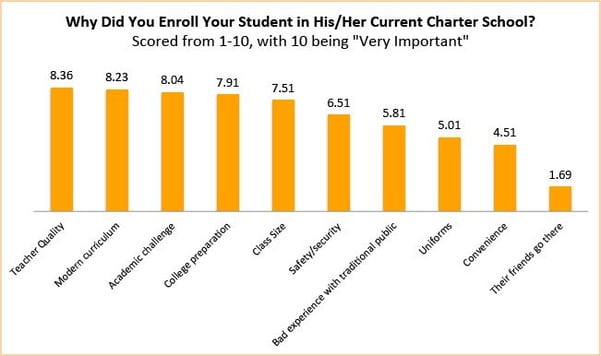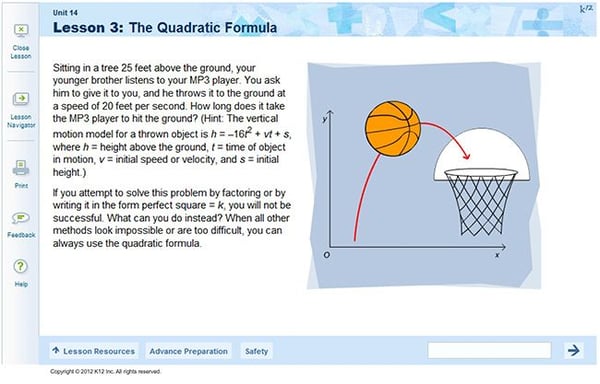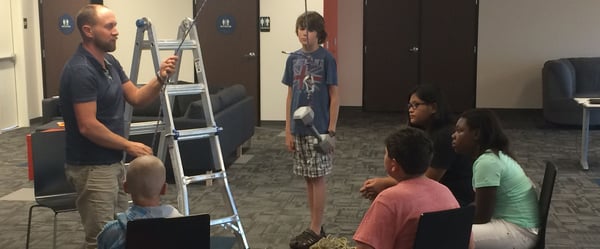What Should I Look For? How To Pick The Right Charter School
LOTS TO CHOOSE FROM
You probably don’t need us to tell you this, but there are lots of schools to choose from - especially with the rapid growth of charter schools. California is at the heart of the school choice movement, with well over 1,000 charter schools. We spoke with a parent recently who had a son at a well-known charter school in San Diego County. She was very diplomatic about it, but she made it clear that there were certain things that just didn’t work for her son at his current school.
This mom isn’t alone. Nearly every day we speak to parents - and often students - who are simply not satisfied with their current school. In this era of school choice, there's no reason to suffer through a school that isn't meeting the specific needs of your child. There are simply too many options out there to choose from. But of course, all of this choice can lead to confusion and information overload.
Below is our best shot at a list for parents to consider when choosing the right school for their child. This post will focus primarily on parents and students considering public charter schools, although it could certainly be expanded to private and traditional public schools as well.
1. Quality of Teachers
It seems so simple, but we've seen that time and time again teachers are the difference between good schools and bad ones. We conducted some research among parents of charter school students recently in areas where charter schools were very prevelant. The results confirmed the old adage that teachers make the difference. Although it sounds like something found on a bumper sticker, it's true. In fact, of all the reasons parents pick charter schools, teacher quality is number one according to our study (sample size was 350).
Below are the choices we presented in the survey. Respondents used "slider bars" to position each question as Very Important (10) or Not Important at All (1). Obviously most of these factors were important to people, but some things, such as teacher quality, rose to the top.

2. Curriculum
Curriculum is changing and evolving at a rapid pace as new standards and requirements (such as The Common Core) are introduced. With all of the changes there have been many advancements in the actual instructional content that students receive. Today, curriculum can be adapted to meet actual student needs in ways that didn't seem possible even a few years ago.
As parents, the important things to look for are format (face-to-face, online, blended, project-based (PBL), etc.) , adaptability and flexibility. Today's students should have access to curriculum that adapts to their skill level, pace, and learning style. Blended learning schools are making huge advancements in this area because, when done well, they can provide a seamless combination of structure and freedom. We believe that both blended and online curriculum provides students with the most opportunities for personalized learning.
For some students, fully online schools are a perfect option. Because this is a big subject that deserves a more detailed discussion we can get into all the pros and cons of online schools in a separate post later.

3. Challenge
Choosing schools that challenge students is essential - not just for college readiness but to ensure boredom doesn't set in. In our study, we weren't surprised to see "Academic Challenge" as a critical component of the charter school selection process, but we were moderately surprised to see it rank more as important than class size.
A 2012 study by the Center for American Progress showed that many schools don't challenge students, with substantial percentages of students themselves reporting that their schoolwork was too easy. Some key findings from the study:
- 51 percent of eighth-grade civics students and 57 percent of eighth-grade history students report that their work is often or always too easy
- 37 percent of fourth-grade students reported that their math work is often or always too easy
- 21 percent of 12th-graders said their math work was often or always too easy, while 56 percent and 55 percent respectively found their civics and history work often or always too easy

4. College Prep
Not all students will go to college. However, college is the appropriate path for most students in order to transition into a meaningful career. It's important that parents examine this angle as well when choosing a school. Parents could look at which schools have a track record of sending students to colleges and universities; and, which colleges and universities. Accreditation is another thing to consider as it's important to most 4 year colleges and universities.
A 2014 article from the Huffington Post cited a study from the US Department of Labor that showed "Americans with four-year college degrees are not only equipped for a fulfilling adult and professional life but made 98 percent more an hour on average than those without a degree." There are many high-profile examples of visionaries and builders who did just fine without a college degree. However, much like the chances of becoming a famous billionaire are slim, the chances of being financially successful and comfortable increase dramatically for those with 4-year college degrees.
5. Class Size
While our study indicated that people understand the importance of small class sizes, we were moderately surprised this didn't rank higher. But if we use research from our marketing of Method Schools in Southern California, we can see that in this specific region class size is key. In fact, from a sample size of over 600 contacts from May 2014 to October 2014, we found that nearly two-thirds requested more information from Method because they were looking for a small class setting for their student(s). Project Based Learning, Adaptive curriculum, wide array of course choices...these features played a role for many. But nothing reached people like telling them how small our class sizes are.
A 2011 report from the Brookings Institute highlighted the difficulty in measuring class size reduction impact: "Because the pool of credible studies is small and the individual studies differ in the setting, method, grades, and magnitude of class size variation that is studied, conclusions have to be tentative. But it appears that very large class-size reductions, on the order of magnitude of 7-10 fewer students per class, can have significant long-term effects on student achievement and other meaningful outcomes." We've found this to be true from a marketing perspective as well. When we talked to people, a class size of 20 (5 less than the average California school) didn't register. But a class size of 8 does, which is what our school offers in our Focused Direct Instruction settings.

6. Safety & Security
School safety and security is important for obvious reasons. Recent high-profile tradgedies have illustrated this in a heartbreaking way. But beyond physical safety and security, we think that students need to find a place where they feel safe. We recently conducted a focus group among high school students in California's Inland Empire region. We discussed why they chose to attend our school. Not surprisingly, many students were bullied or even beat up in their traditional public schools. All students absolutely deserve to attend school where they feel (and are) safe.
Other Factors to Consider
Beyond these important factors for parents to weigh when choosing the right school for their student(s), here are a few more characteristics that deserve consideration:
- A strong school community
- Extra-curricular activities
- School culture
- Outstanding customer service
- Efffective use of technology
- A school vision that is consistent and exciting
- Schools that do what they say (they deliver on promises)
FINAL THOUGHTS
We don't have all the answers. But as parents and school entrepreneurs our experience has shown that, time and time again, parents and students who research schools thoroughly, and choose schools for the right reasons, tend to be happy and content in their choices.
Have more considerations we should have added to our list? Or, just thoughts or ideas? Let us know in the comments section. Happy researching!
List compiled and research done by Mark Holley and Jessica Venezia, co-founders of Method Schools.




-1.svg)
-1.svg)
.svg)
.svg)
.svg)

.svg)










.svg)
.svg)

